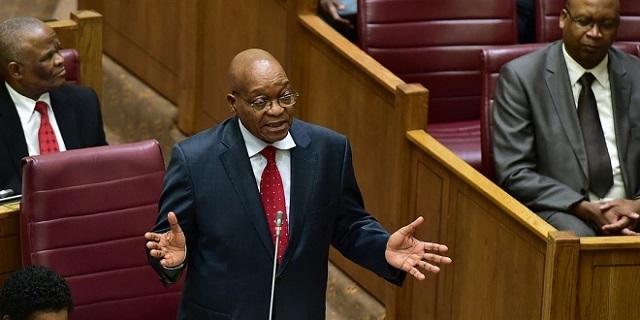
Cape Town, South Africa | AFP | A parliamentary vote of no confidence in South African President Jacob Zuma will be held by secret ballot, it was announced Monday, in a move that could encourage some ANC lawmakers to choose to oust him.
The vote to be held Tuesday has become a test of African National Congress (ANC) unity as senior party figures have been increasingly critical of their leader — but it is unlikely to succeed in toppling Zuma.
“Voting on the motion of no confidence in the president… will be by secret ballot,” parliament Speaker Baleka Mbete announced, in a decision that took many analysts by surprise.
Zuma, who came to power in 2009, has been implicated in multiple corruption scandals, while the South African economy has fallen into recession and unemployment has risen to record levels.
The 75-year-old is due to step down as head of the ANC in December, and as president before the 2019 general election — lessening pressure for his party to seek imminent change.
The vote has been subject to a long legal battle waged by opposition parties, with the Constitutional Court ruling that a secret ballot was an option.
“It’s a surprising but strategic move,” independent analyst Judith February told AFP.
“Zuma is likely to remain even if a few MPs vote against him. I would be very surprised if Zuma goes by this process.
“The decision takes the wind out of the sails of the opposition as well as civil society marches and activism around this issue.”
– ‘Larceny on a grand scale’ –
Anti-Zuma protesters gathered outside the parliament in Cape Town on Monday, with further protests from supporters of both camps expected on Tuesday.
“ANC MPs now have no excuse. They must use their vote tomorrow to stand up to grand corruption and vote to remove Jacob Zuma as president,” the main opposition Democratic Alliance party said.
A group of ANC veterans from the anti-apartheid struggle also called for MPs to vote against Zuma, who was himself imprisoned with Nelson Mandela on Robben Island under white-minority rule.
South Africa is “witness to larceny on a grand scale, leaving the country not only impoverished, but also increasingly in the hands of criminalised and compromised governance,” the ANC veterans said.
But the ANC party leadership has fought back, saying it expects its lawmakers to support the president.
“We have no doubt that this frivolous motion, which has been hyped up by opposition parties as some sort of Damascus moment, will fail like many before it,” it said.
Last week party chief whip Jackson Mthembu acknowledged recent criticism of the ANC and the impact of a cabinet reshuffle in March when respected finance minister Pravin Gordhan was replaced with a Zuma loyalist.
Gordhan’s sacking led to a string of downgrades to South Africa’s credit rating as well as causing the rand currency to tumble.
Public support for the ANC, which swept to power under Mandela in the first non-racial elections in 1994, slipped to 55 percent in last year’s local polls — its worst-ever result.
But Zuma has easily survived several previous parliamentary votes attempting to oust him, due to the ANC holding 249 seats in the 400-seat parliament.
Nomura analyst Peter Attard Montalto said in a note to investors last week that he did not expect the vote to succeed, even if there was a secret ballot.
“There is a higher probability of the vote being passed under a secret ballot (but) ultimately we think most anti-Zuma MPs worry a secret ballot will not be secret because of the involvement of the security services and numbered ballot papers,” he wrote.
Related Video
 The Independent Uganda: You get the Truth we Pay the Price
The Independent Uganda: You get the Truth we Pay the Price





